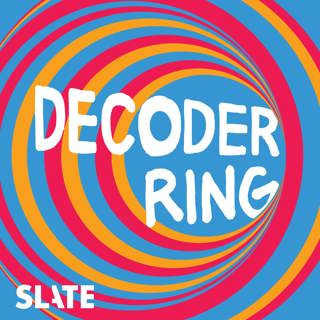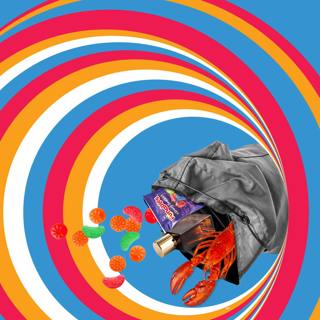
Truck Nutz (Encore)
Truck Nutz is a brand name for the dangling plastic testicles some people affix to the bumpers or hitches of their vehicles. Also sold as Bulls Balls, Your Nutz, and other brand names, these plastic novelties have a powerful symbolic charge and are often associated with a crass, macho, red state audience. But truck nuts are a surprisingly complicated signifier whose symbolic power is increasingly divorced from their real-world usage. On this episode, we talk to owners and users of truck nuts, investigate the origins of the accessories, and deconstruct the meaning of these oft-joked-about symbols. We’ll also take a tour of other novelty testicle products, including Bike Balls (testicular bike lights), Gunsticles (plastic testicles for guns), and Neuticles (prosthetic testicles for neutered pets), to better understand the maligned symbolism of truck nuts. Links and further reading on some of the things we discussed on the show: Ad for Monster Truck Nuts Truck Nutz Prank Call Elie Mystal’s writing on truck nuts for Above the Law Austin Vasectomy in Austin Texas This episode was written by Willa Paskin and edited and produced by Benjamin Frisch. Decoder Ring is produced by Katie Shepherd and Max Freedman. Evan Chung is our supervising producer. If you have any cultural mysteries you want us to decode, email us at DecoderRing@slate.com. Or you can also call us now at our new Decoder Ring hotline at 347-460-7281. We love to hear any and all of your ideas for the show. Want more Decoder Ring? Subscribe to Slate Plus to unlock exclusive bonus episodes. Plus, you’ll access ad-free listening across all your favorite Slate podcasts. Subscribe now on Apple Podcasts by clicking “Try Free” at the top of the Decoder Ring show page. Or, visit slate.com/decoderplus to get access wherever you listen. Learn more about your ad choices. Visit megaphone.fm/adchoices
12 Mar 39min

Jerry Lewis’ Lost Holocaust Clown Movie
In 1972, Jerry Lewis—the actor and filmmaker known for slapstick comedies like The Nutty Professor—took the biggest risk of his career when he decided to make a drama called The Day The Clown Cried, about a circus clown who ends up in Auschwitz. This could have been a landmark as one of the first portrayals of the Holocaust in American cinema. Instead, it became a different kind of landmark: allegedly, one of the worst movies ever. The Day The Clown Cried was never released, and only a handful of people have ever seen it. But the unbelievable concept alone has been enough to make this lost movie a holy grail for curious film buffs. In this episode of Decoder Ring, producer Max Freedman traces how The Day The Clown Cried became such a legendary disaster, why it’s impossible to see, and whether it actually deserves its rotten reputation. You’ll hear from comedian Patton Oswalt; Shawn Levy, author of King of Comedy: The Life and Art of Jerry Lewis; Henry Gonshak, author of Hollywood and the Holocaust; Chuck Denton, whose father Charles co-wrote The Day The Clown Cried; and Jean-Michel Frodon, film critic at slate.fr. If you have any cultural mysteries you want us to decode, email us at DecoderRing@slate.com. Or you can also call us now at our new Decoder Ring hotline at 347-460-7281. We’d love to hear any and all of your ideas for the show. Want more Decoder Ring? Subscribe to Slate Plus to unlock exclusive bonus episodes. Plus, you’ll access ad-free listening across all your favorite Slate podcasts. Subscribe now on Apple Podcasts by clicking “Try Free” at the top of the Decoder Ring show page. Or, visit slate.com/decoderplus to get access wherever you listen. Learn more about your ad choices. Visit megaphone.fm/adchoices
26 Feb 56min

The Scratch-Off Ticket’s Instant Win
You may never have thought very hard about scratch-off tickets, but that’s part of their power. They’re a form of gambling that’s simply a pedestrian part of American life. But not so long ago, they were risky and innovative, the killer app of their time and the must-play game of the state lottery. In this episode, Ian Coss, host of the new podcast series Scratch & Win, is going to walk us through the history of the scratch-off ticket: its invention, its popularization, and its connection to the explosion in gambling that’s now all around us. This episode of Decoder Ring was produced by Katie Shepherd. Decoder Ring is also produced by Willa Paskin, Evan Chung and Max Freedman. Derek John is Executive Producer. Merritt Jacob is Senior Technical Director. Scratch & Win is a production of GBH News. It is produced by Isabel Hibbard and Ian Coss and edited by Lacy Roberts. Its editorial supervisor is Jenifer McKim with support from Ryan Alderman. Mei Lei is the project manager, and the Executive Producer is Devin Maverick Robins. If you have any cultural mysteries you want us to decode, please email us at DecoderRing@slate.com. And you can also now call us at our Decoder Ring hotline — that number is 347-460-7281. We love hearing your ideas, and we especially enjoyed all the messages we got about our last episode on the ’90s swing craze. Keep ‘em coming! And even better, tell your friends to check us out. Want more Decoder Ring? Subscribe to Slate Plus to unlock exclusive bonus episodes. Plus, you’ll access ad-free listening across all your favorite Slate podcasts. Subscribe now on Apple Podcasts by clicking “Try Free” at the top of the Decoder Ring show page. Or, visit slate.com/decoderplus to get access wherever you listen. Learn more about your ad choices. Visit megaphone.fm/adchoices
12 Feb 37min

Jump, Jive and Fail: The ’90s Swing Craze
When we got multiple listener emails asking about the swing revival of the late 1990s, host Willa Paskin’s first, knee jerk reaction was just: no. She lived through it, and remembers it as being so incredibly corny and uncool. Insofar as the swing revival persists in the cultural memory, it’s usually as a punchline or as head-scratcher, a particularly odd-seeming fad. But then we started talking to everyone who was anyone in the swing scene, from Big Bad Voodoo Daddy to the dancers in the infamous Gap khakis commercial. It turns out the 90’s swing revival is more involved, more interesting and, OK, maybe cooler than we ever imagined. It’s about an underground scene that went above ground in a major way, and how that level of success can obscure what’s happening while it’s happening—but also long after it’s over. This episode was written and produced by Willa Paskin, Evan Chung, and Sofie Kodner with mix help from Max Freedman. Decoder Ring is produced by Willa Paskin, Evan Chung, Max Freedman and Katie Shepherd. Derek John is Executive Producer. Merritt Jacob is Senior Technical Director. Thank you to listeners Lorraine Denman and Alex Friendly for originally asking us about the ‘90s swing revival. In this episode, you’ll hear from Mando Dorame, Michael Moss, Scotty Morris, Tom Maxwell, Sylvia Skylar, Christian Perry, Steve Perry, John Bunkley, and Carl Byrd. Thank you to Kerstin Emhoff, Tom Breihan, Stephanie Landwehr, and Ken Partridge, whose conversation and book Hell of a Hat: The Rise of '90s Ska and Swing was extremely helpful. If you have any cultural mysteries you want us to decode, email us at DecoderRing@slate.com. Or you can also call us now at our new Decoder Ring hotline at 347-460-7281. We love to hear any and all of your ideas for the show. Want more Decoder Ring? Subscribe to Slate Plus to unlock exclusive bonus episodes. Plus, you’ll access ad-free listening across all your favorite Slate podcasts. Subscribe now on Apple Podcasts by clicking “Try Free” at the top of the Decoder Ring show page. Or, visit slate.com/decoderplus to get access wherever you listen. Learn more about your ad choices. Visit megaphone.fm/adchoices
29 Jan 1h 4min

I am Tupperware, I Contain Multitudes
The storage container is a stealthy star of the modern home. It’s something we use to organize more of our stuff than ever before, and also something other people use to organize their stuff for our viewing pleasure. Its role as a source of soothing, satisfying, potentially viral clicks is new, but storage container innovations are not – something we had occasion to remember when Tupperware, the company, recently filed for bankruptcy. Tupperware was the original container craze. In today’s episode we’re going to connect it to the contemporary one, because as it happens, for a long time now, we’ve been filling empty plastic boxes with far more than just leftovers. This episode was reported and produced by Olivia Briley. It was edited by Willa Paskin. Decoder Ring is produced by Willa Paskin, Evan Chung, Katie Shepherd and Max Freedman. Derek John is Executive Producer. Merritt Jacob is Senior Technical Director. In this episode, you’ll hear from Amanda Mull who wrote the articles “Tupperware Is in Trouble” and “Home Influencers Will Not Rest Until Everything Has Been Put in a Clear Plastic Storage Bin.” And from Bob Kealing, the author of Tupperware Unsealed Brownie Wise, Earl Tupper, and the Home Party Pioneers. If you have any cultural mysteries you want us to decode, email us at DecoderRing@slate.com Want more Decoder Ring? Subscribe to Slate Plus to unlock exclusive bonus episodes. Plus, you’ll access ad-free listening across all your favorite Slate podcasts. Subscribe now on Apple Podcasts by clicking “Try Free” at the top of the Decoder Ring show page. Or, visit slate.com/decoderplus to get access wherever you listen. Learn more about your ad choices. Visit megaphone.fm/adchoices
15 Jan 43min

Introducing Planet Money: Can Money Buy Happiness?
People often say that money can't buy you happiness. Sometimes, if you ask them to tell you more about it, they'll mention a famous 2010 study by Nobel Prize winners Daniel Kahneman and Angus Deaton. That study found that higher household income correlates with greater emotional well-being, but only up to around $75,000 a year. After that, more money didn't seem to matter. This was a famous study by two famous academics. The result stood for over a decade. And it feels good, right? Maybe the rich aren't so much happier than anyone else. But researchers have recently done a complete 180 on this idea. In 2021, psychologist Matt Killingsworth found nearly the opposite: That more money does correlate with more happiness. And that the relationship continues well beyond $75,000 per year. Today on the show: Does more money mean fewer problems? Two researchers with totally different takes come together to hammer out a better understanding of the relationship between money and happiness. This episode was hosted by Sally Helm and Nick Fountain. It was produced by Sean Saldana, Sam Yellowhorse Kesler, and Emma Peaslee. It was edited by Meg Cramer and fact-checked by Sierra Juarez. Engineering by Cena Loffredo. Alex Goldmark is Planet Money's executive producer. Learn more about your ad choices. Visit megaphone.fm/adchoices
1 Jan 30min

Mailbag: Fruit Snacks, Waterbeds, and Lobster Tanks
It’s our annual mailbag episode! We get a lot of wonderful reader emails suggesting topics for the show — and at the end of the year we try to answer some of them. This year, we’re tackling four fascinating questions. Why do grocery stores keep live lobsters in tanks, unlike any other animal? How did candy get rebranded as “fruit snacks” when fruit is already a snack? Whatever happened to perfumed ads in magazines? And what was the waterbed all about? We’ll get an answer from the waterbed’s inventor who still has four of them. You’ll hear from Ray Shalhoub of Joray Fruit Rolls, consumer lawyer Steve Gardner, Jessica Murphy, aka the “Perfume Professor,” inventor Charlie Hall, restaurant historian Jan Whitaker, and the CEO of Crustacean Compassion, Dr. Ben Sturgeon. This episode was produced by Max Freedman and Sofie Kodner. Decoder Ring is also produced by Willa Paskin, Evan Chung, and Katie Shepherd. Derek John is Executive Producer. Merritt Jacob is Senior Technical Director. If you have any cultural mysteries you want us to decode, email us at DecoderRing@slate.com. Want more Decoder Ring? Subscribe to Slate Plus to unlock exclusive bonus episodes. Plus, you’ll access ad-free listening across all your favorite Slate podcasts. Subscribe now on Apple Podcasts by clicking “Try Free” at the top of the Decoder Ring show page. Or, visit slate.com/decoderplus to get access wherever you listen. Disclosure in Podcast Description: A Bond Account is a self-directed brokerage account with Public Investing, member FINRA/SIPC. Deposits into this account are used to purchase 10 investment-grade and high-yield bonds. As of 9/26/24, the average, annualized yield to worst (YTW) across the Bond Account is greater than 6%. A bond’s yield is a function of its market price, which can fluctuate; therefore, a bond’s YTW is not “locked in” until the bond is purchased, and your yield at time of purchase may be different from the yield shown here. The “locked in” YTW is not guaranteed; you may receive less than the YTW of the bonds in the Bond Account if you sell any of the bonds before maturity or if the issuer defaults on the bond. Public Investing charges a markup on each bond trade. See our Fee Schedule. Bond Accounts are not recommendations of individual bonds or default allocations. The bonds in the Bond Account have not been selected based on your needs or risk profile. See https://public.com/disclosures/bond-account to learn more. Learn more about your ad choices. Visit megaphone.fm/adchoices
18 Des 202449min

Mystery of the Mullet (Encore)
The mullet, the love-to-hate-it hairstyle, is as associated with the 1980’s as Ronald Reagan, junk bonds, and breakdancing. But in at least one major way, we are suffering from a collective case of false memory syndrome. In this episode we track the rise and fall of the mullet, and also the lexical quandary at its heart: Who named the mullet? We learn how David Bowie, hockey players, the Oxford English Dictionary, the Beastie Boys, a mysterious Reddit user named Topsmate, and a group called Annoy Club all played a part in the strange history of the mullet. Some of the voices you’ll hear in this episode include proud mullet-wearer Lauren Wright, amateur mullet-sleuth Oskar Sigvardsson, writer, market researcher, and 1980’s hockey teenager John Warner, head of product for Oxford Languages Katherine Connor Martin, and novelist and Grand Royal contributor Warren Fahy. This episode was produced by Willa Paskin and Benjamin Frisch. If you have any cultural mysteries you want us to decode, email us at DecoderRing@slate.com Want more Decoder Ring? Subscribe to Slate Plus to unlock exclusive bonus episodes. Plus, you’ll access ad-free listening across all your favorite Slate podcasts. Subscribe now on Apple Podcasts by clicking “Try Free” at the top of the Decoder Ring show page. Or, visit slate.com/decoderplus to get access wherever you listen. Disclosure in Podcast Description: A Bond Account is a self-directed brokerage account with Public Investing, member FINRA/SIPC. Deposits into this account are used to purchase 10 investment-grade and high-yield bonds. As of 9/26/24, the average, annualized yield to worst (YTW) across the Bond Account is greater than 6%. A bond’s yield is a function of its market price, which can fluctuate; therefore, a bond’s YTW is not “locked in” until the bond is purchased, and your yield at time of purchase may be different from the yield shown here. The “locked in” YTW is not guaranteed; you may receive less than the YTW of the bonds in the Bond Account if you sell any of the bonds before maturity or if the issuer defaults on the bond. Public Investing charges a markup on each bond trade. See our Fee Schedule. Bond Accounts are not recommendations of individual bonds or default allocations. The bonds in the Bond Account have not been selected based on your needs or risk profile. See https://public.com/disclosures/bond-account to learn more. Learn more about your ad choices. Visit megaphone.fm/adchoices
4 Des 202451min





















